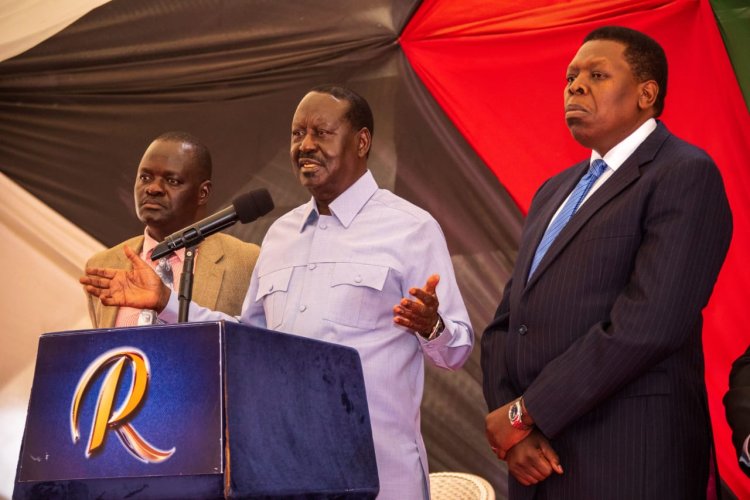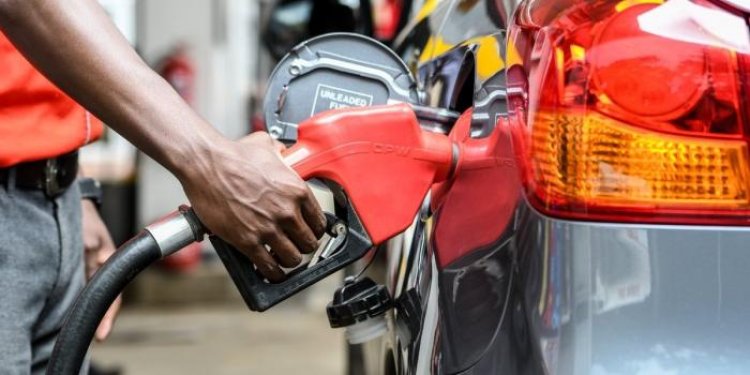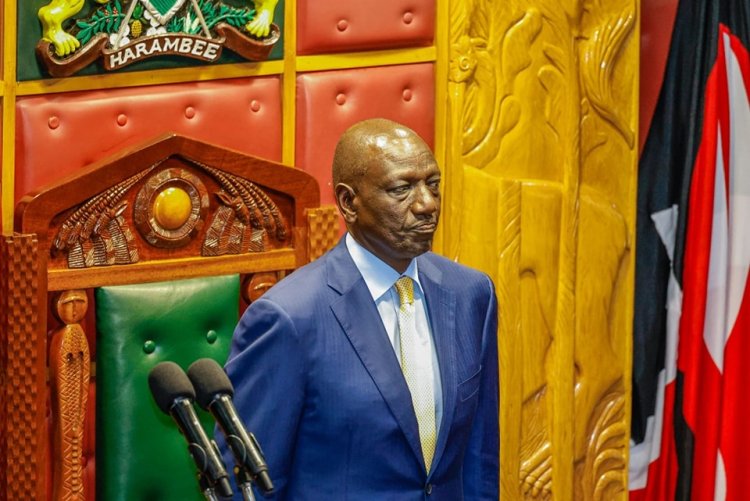Raila Demands Ruto To Cancel Govt to Govt Oil Deal
The former Prime Minister alleged that Ruto masked the deal as a government project to help Kenyan Companies, Gulf Energy, Galana Oil Kenya Ltd, and Oryx Energies Kenya Limited avoid paying taxes.

Azimio la Umoja leader, Raila Odinga has demanded that President William Ruto cancels the government-to-government deal he signed with Saudi Arabia oil companies.
Raila gave his dossier of the Government-to-Government Memorandum of Understanding with Saudi Arabia and the United Arab Emirates for supply of oil to Kenya on favourable terms, claiming Ruto told the country that some four men in his administration had put together something “phenomenal” in Kenya.
The former Prime Minister alleged that Ruto masked the deal as a government project to help Kenyan Companies, Gulf Energy, Galana Oil Kenya Ltd, and Oryx Energies Kenya Limited avoid paying taxes.
"There was no G-to-G. Kenya did not sign any contract with Saudi Arabia or the UAE. Only the Ministry of Energy and Petroleum signed a deal with state owned petroleum companies in the Middle East. Why Ruto chose to characterize the deal as a G-to-G is the first red flag that points to mischief in this deal.

A car being fuelled at a petrol station. /FILE
"We now know that the characterization of this deal as G-to-G was meant to shield the three Kenyan companies from paying 30 per cent corporate tax," he revealed.
He also highlighted the bad fruits that emerged from the deal such as the cost of oil which was yet to come down and that the Kenyan shilling was continuing to record a bad performance against the dollar.
"The scarcity of the dollar has continued. The land locked countries that depend on us for oil are abandoning our pipeline because it has become too expensive. In other words, the deal has not addressed any of the problems Ruto said it would.
"When Ruto initiated this deal, the US-dollar to Kenya-shilling exchange rate was Ksh132. Today, six months later, it is Ksh159 to the dollar. The cost of fuel shot up significantly after the deal. Why have things moved from bad to worse since the deal?" Raila posed.
While claiming that the deal was corrupt, Raila demanded full disclosure and accountability, terming the deal as corrupt and rotten to the core and an element of state capture by Ruto and company and a conspiracy against the country.
Other than keeping the cost of oil permanently high in Kenya, Raila claimed that the deal is costing the country dearly in terms trade in petroleum with landlocked neighbours.
"It is shrouded in deep secrecy. To date, only two documents have been made public; that is the Master Framework Agreement with petroleum trading entities and the Open Tender System modified agreement with marketers.
"The Supplier Purchase Agreement between the Middle East Oil firms and their hand-picked distributors in Kenya has never been seen. We challenge Ruto to publish this document," he continued.
Raila claimed that in August, four months after the deal, the government allowed Oryx Energies to sell oil at prices that had been inflated by 17 per cent as Oryx is the supplier of diesel to other oil marketing companies (OMCs) in the country. He claimed that the excuse was the delay in discharging fuel at the jetty.
"This shady business model is being deployed by all the companies that were retained in the Ruto deal. They buy at low prices, delay in discharging, then ask to be allowed to offload at higher prices and the cost is passed to consumers," he went on.
Raila further divulged that some of the companies charging the higher prices deliver more cargo than they were contracted to deliver, forcing Kenyans to buy more of the oil whose prices are inflated, hence the permanent high prices of petroleum products.
The Azimio leader also revealed that the deal accelerated diplomatic tiffs and broken trade agreements with neighbouring landlocked countries such as Uganda.
"Uganda has announced it would no longer purchase petroleum products from Kenya because middlemen have inflated prices by up to 59 per cent, imposing too high a cost on consumers. The exact same scenario is prevailing here. The middle men president Museveni is talking about are Kenya government officials," he pointed an accusing finger.
Therefore, Raila demanded that other than Ruto cancel the deal, he should revert to the Open Tender System which ensured guaranteed supply of petroleum products.
"It assigned responsibility to various players as opposed to the so called G to G that is making Kenyans depend on one inefficient and corrupt player. The open tender system was efficient, accountable and competitive and offered prices commensurate with international pricing model," he explained.

President William Ruto at Parliament on November 9, 2023. /MUSALIA MUDAVADI
Raila also demanded that the Ethics and Anti-Corruption Commission (EACC) move in not to sanitize but to get to the bottom of how and why Kenya got into the oil deal and who is benefiting from it.
Other demands include:
- The men and women who came up with this self-serving deal must be surcharged and sacked.
- The government must restore taxes to 8 per cent from the 16 per cent that came with the Finance Act.
- The government must make public the so-called MoU between Kenya and Saudi Arabia and the United Arab Emirates.
- The Ministry of Energy and Petroleum must make public the deal it signed with the oil companies.
- The Ministry of Energy and Petroleum must make public the Supplier Purchase Agreement it signed with the oil companies.
- EACC and the Directorate of Criminal Investigations must investigate the tax compliance status and pricing model of the three oil companies.
- The Kenya Revenue Authority must come clean on the tax compliance status of the three oil companies and explain why they are being enabled to evade billions in taxes while ordinary Kenyans are being harassed for taxes.
- We need a comprehensive brief on what the move by Uganda to pursue much of its petroleum needs through the Tanzanian Central corridor means to our country especially to the future of the Kenya Pipeline Company.

 admin
admin 




